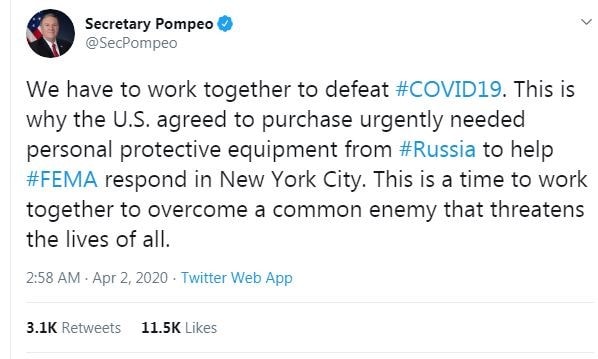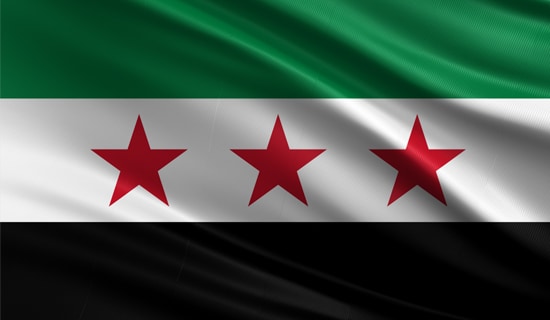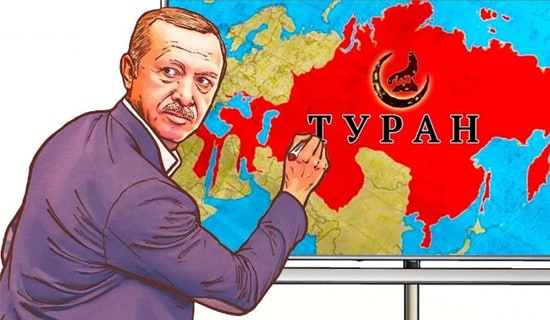On April 2, 2020, a Russian military cargo plane landed in New York carrying ventilators and protective gear to help in the fight against the coronavirus. The shipment was the result of a March 30, 2020, conversation between US president Donald Trump and Russia's President Vladimir Putin, where they discussed oil prices and the fight against the coronavirus.[1] Trump called the delivery "very nice", and was assailed immediately at home for handing Russia a propaganda victory.[2]
Indeed some in Russia viewed the delivery as a sign that the U.S. was now a supplicant and direly needed Russian help that was generously offered without a demand for political recompense. Some viewed the gesture as a possible turning point in bilateral relations. The delivery was criticized in both the US and Russia. In America, critics of the administration argued that Russia had been handed a cheap propaganda victory; in Russia complaints were made that the country could not afford to ship medical equipment abroad when it was sorely needed at home.
The terms of the delivery turned into a slightly embarrassing topic when the State Department spokesperson revealed that the cargo was not a gift but a purchase, contrary to the previous impression created by pro-regime spokespersons in Russia.
Below, is a recapitulation of the reactions to the medical supplies delivery story:

The Russian military cargo plane is loaded with medical supplies for delivery to U.S. (Source: Rbc.ru)
The Delivery Demonstrated Russian Noblesse And The Reversal Of Fortunes
According to the military correspondent Yevgeny Poddubny, the coronavirus exposed the hypocrisy and helplessness of the United States and other Western countries. Once in the 90s, Americans laughed at the troubles of Russians, but now they themselves accept our humanitarian aid, Poddubny posted on Telegram.[3]
The chair of the State Duma’s Committee on International Affairs Leonid Slutsky commented: "Russia, in principle, within the context of the civilizational struggle against the pandemic, simply helps people survive, regardless of whether they are Iranians, Italians or Americans. This is the most important humanitarian mission without consideration for the 'political impact' – the lifting of sanctions or a change of tone in the mutual dialogue. And I consider this position to be the most correct one."[4]
Will The Gesture Have Longer Term Repercussions?
The outlet Vz.ru sought the advice of experts on whether this deal provided a portent of future bilateral and even global relations. America-watcher Boris Mezhuyev, an associate professor at Moscow State University, predicts that the world will no longer pursue national egoism as "national egoism will be condemned as the main source of all calamities." "This strategy has been demonstrated by a number of European countries. The West will continue to criticize everyone who shows such selfishness,” - said Mezhuyev. The current epidemic he believed would shock America. "The Americans are very proud that they did not suffer a great deal during the two world wars. If we take the West as a whole, the number of deaths from coronavirus is comparable to the number of victims in a regional war… Now the world will turn towards national solidarity, which will complicate the situation for Trump. After all, he went to the election with the theme of American national priority. Therefore, he needs advisers who will instruct him on how to behave correctly in this issue. He stands at a crossroads. … Trump has always advocated good relations with Moscow, and he was right - Russia provides help. For Trump, this is a chance to demonstrate the accuracy of his forecasts and get a head start on the upcoming presidential election."

Boris Mezhuyev (Source: News365.ru)
The director for scientific research of the Valdai Discussion Club, Fyodor Lukyanov, was dismissive of such optimism. He believes that Trump’s complimenting Moscow on sending a "very large plane," should not be overestimated.
“This statement will soon be forgotten in the United States. And if they do not forget, it will be only be worse for Trump, because his opponents will begin exploit the theme, that "the president has sold out," "Russia is not helping [us] for nothing" and so on. By and large, relations with Russia are now are not a priority for the United States, they don’t care about the rest of the world, because the situation with the coronavirus is developing at an alarming rate... Moreover, the tendency to build a strictly sovereign policy, a policy that is much more focused on internal interests, began to intensify long before the first news of the coronavirus. The very clear evidence of this new global atmosphere was the victory of a man like Donald Trump in the U.S. elections. Globalist and universalist sentiments ceased to be accepted by a significant part of societies, primarily in the West. Trump and the so-called European populists are largely a product of this trend. Of course, the COVID-19 pandemic greatly accelerated such sentiments, simply because isolation is the only way to counter mass epidemic… Timid attempts and statements at cooperation rest on the fact that everyone has a limited amount of resources, and 'everyone needs them for themselves.' So I don’t see the reasons why the development of national egoism could be reversed", concluded Lukyanov.[5]

Fyodor Lukyanov (Source: Interfax.ru)
The Delivery Is Criticized In Both Countries
The delivery was criticized in the United States as it appeared to support the narrative of Russian leadership. Brett McGurk, a former American diplomat, who served under Trump and former Presidents Barack Obama and George W. Bush claimed. "Nothing to see here. Just a Russian military aircraft landing at JFK with 60 tons of medical supplies to support America’s #COVID19 response. A propaganda bonanza as our own government shrinks from America’s leadership role in a global crisis," McGurk said.[6]
Ben Hodges, the former commanding general of the U.S. Army in Europe, first called the delivery a hoax "But it’s a gift TO the Kremlin, not FROM it, if it is true," he tweeted.[7]
Criticism was voiced in Russia as well. Vladimir Zhirinovsky, leader of the ultranationalist "Liberal Democratic Party, said: “We have always opposed any help abroad, because we ourselves need all these funds here and now. After all, everyone sees that we don’t have enough masks, people sew them from improvised means, you can’t buy them at pharmacies."[8]
Shortages of medical equipment have been previously reported in Russia. For example, the Alliance of Doctors trade union issued a demand that necessary protective equipment, disinfectants, equipment, reagents and consumables be immediately provided to all employees of the Kalachevsky Central District Hospital. "There are only two operative mechanical ventilation machines. If 10 people will be infected with coronavirus, only 2 of them can be saved".[9]
Putin's press secretary Dmitry Peskov felt compelled to address this criticism: "Such criticism is always around, but at the same time, international cooperation in the fight against coronavirus is a very important dimension of any country's activity, and a necessary dimension as well, because without international cooperation, no country alone can effectively fight the coronavirus."[10]
State Department Announcement Throws Monkey Wrench Into The Narrative
Perhaps stung by the domestic criticism, the State Department in a statement by spokesperson Morgan Ortagus sought to put things into perspective:
"The United States is committed to the global fight against COVID-19. We are a generous and reliable contributor to crisis response and humanitarian action across the world, but we cannot do it alone. The countries of the G20 agreed last week to work together to defeat the coronavirus, and we are working closely with these countries and others to ensure that critically needed supplies get to those in need.
As a follow-up to the March 30 phone call between President Trump and President Putin, the United States has agreed to purchase [emphasis added] needed medical supplies, including ventilators and personal protection equipment, from Russia, which were handed over to FEMA on April 1 in New York City.
Both countries have provided humanitarian assistance to each other in times of crisis in the past and will no doubt do so again in the future. This is a time to work together to overcome a common enemy that threatens the lives of all of us."
On the State Department website Ortagus' statement ran under the prominent headline: "U.S. Purchase of Needed Supplies from Russia."[11]
Obviously, the statement was at variance with the official Russian narrative. Opposition sites pointed out the inconsistency:
"But at the same time, Russian state-run media, in particular Vesti, called the deliveries "humanitarian aid", without indicating that the United States paid for it. The same word [in Russian humanitarian aid is one word] was used by Russian President Vladimir Putin's press secretary Dmitry Peskov:
"'On the Russian side, amidst the dire epidemiological situation in America, assistance was offered in the form of medical equipment and protective equipment. Trump gratefully accepted this humanitarian assistance,' Peskov said.
"Earlier, the Kremlin, state media and pro-Kremlin bloggers similarly used the trip of Russian military medical personnel to Bergamo and other Italian cities with a large number of patients suffering from coronavirus infection for propaganda. This trip was also called 'humanitarian aid', which the Italian authorities 'gratefully accepted.'"[12]
Not A Gift But A Cut-rate Purchase
Both sides backpedaled and came up with a consistent narrative, the delivery was not a gift but a purchase that was below the market price. Russian Foreign Ministry spokesperson, Maria Zakharova said that half the cost of humanitarian aid from Russia to the United States was paid by the Russian Direct Investment Fund, while the other half was paid by the American side.
She expressed confidence that, if necessary, the United States will be able to support Russia in the fight against coronavirus infection.[13]
On the American side, a senior official told the New York Post: "The United States is purchasing the supplies and equipment outright, as with deliveries from other countries…We appreciate Russia selling these items to us below market value.[14]
U.S. Secretary of State Mike Pompeo sought to close the issue with following tweet:

[1] Thedailybeast.com, April 1, 2020.
[2] Washingtonpost.com, April 2, 2020.
[3] Tsargrad.tv, April 2, 2020.
[4] Regnum.ru, March 31, 2020
[5] Vz.ru, April 1, 2020.
[6] Reuters.com, April 2, 2020.
[7] Washingtonpost.com, April 2, 2020.
[8] Regnum.ru, April 2, 2020
[9] Youtube.com/watch?v=qE8qMMLNp3o, March 27, 2020.
[10] Vz.ru, April 2, 2020.
[11] State.gov, April 1, 2020.
[12] Currenttime.tv.ru, April 2, 2020.
[13] Nakanune.ru, April 2, 2020.
[14] Nypost.com, April 2, 2020.





